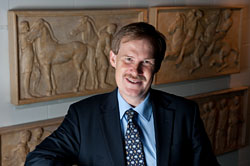If you've been paying attention, you'll probably have figured out that David Gill is our current golden boy in the cultural heritage blogosphere. Last week he accepted the Archaeological Institute of America's Outstanding Public Service Award (aka the archaeology Oscar) and earlier this year he moved from Swansea University to be professor of archaeological heritage at University Campus Suffolk. His acceptance speech at the AIA awards did not mince words and directly called out institutions that have refused to take responsibility for their actions in supporting the illicit antiquities trade. Dr. Gill's blog Looting Matters is one of the first blogs I turn to when I've been away from the news for a while. My reason for featuring Looting Matters isn't just because you should absolutely be reading it if you're at all serious about these issues, or because it's one the first blogs to report on emerging topics as they happen (as opposed to days or weeks later when no one really cares anymore), or because Dr. Gill's voice has never wavered in addressing these issues. It's because it is also an astounding record of the illicit antiquities trade and cultural heritage issues that students can easily take advantage of for their research. A final project I did for a class last term consisted of a portfolio detailing the conflict between the St. Louis Art Museum and Egypt over the funerary mask of Ka-Nefer-Nefer. As I scoured my library's resources for articles covering the conflict, I soon realized that Looting Matters was becoming one of my most used and valued sources. The timeline for the conflict was fuzzy from conflicting news reports; because Dr. Gill blogs so promptly and succinctly on issues as they happen, his posts helped me clarify the conflict's timeline and events in a way that Ebscohost could not. Looting Matters is not just a commentary, but is an incredible resource for issues that have come and gone, are ongoing, or are only just beginning. This is particularly useful for students like me who know the famous controversies (the Parthenon Marbles, the Getty, Euphronius Krater, blah blah blah) but don't have any experience with conflicts or events that haven't been published in gripping non-fiction form.
Congratulations to David again on his award!


Meg
ReplyDeleteThank you for your kind words.
Best wishes
David